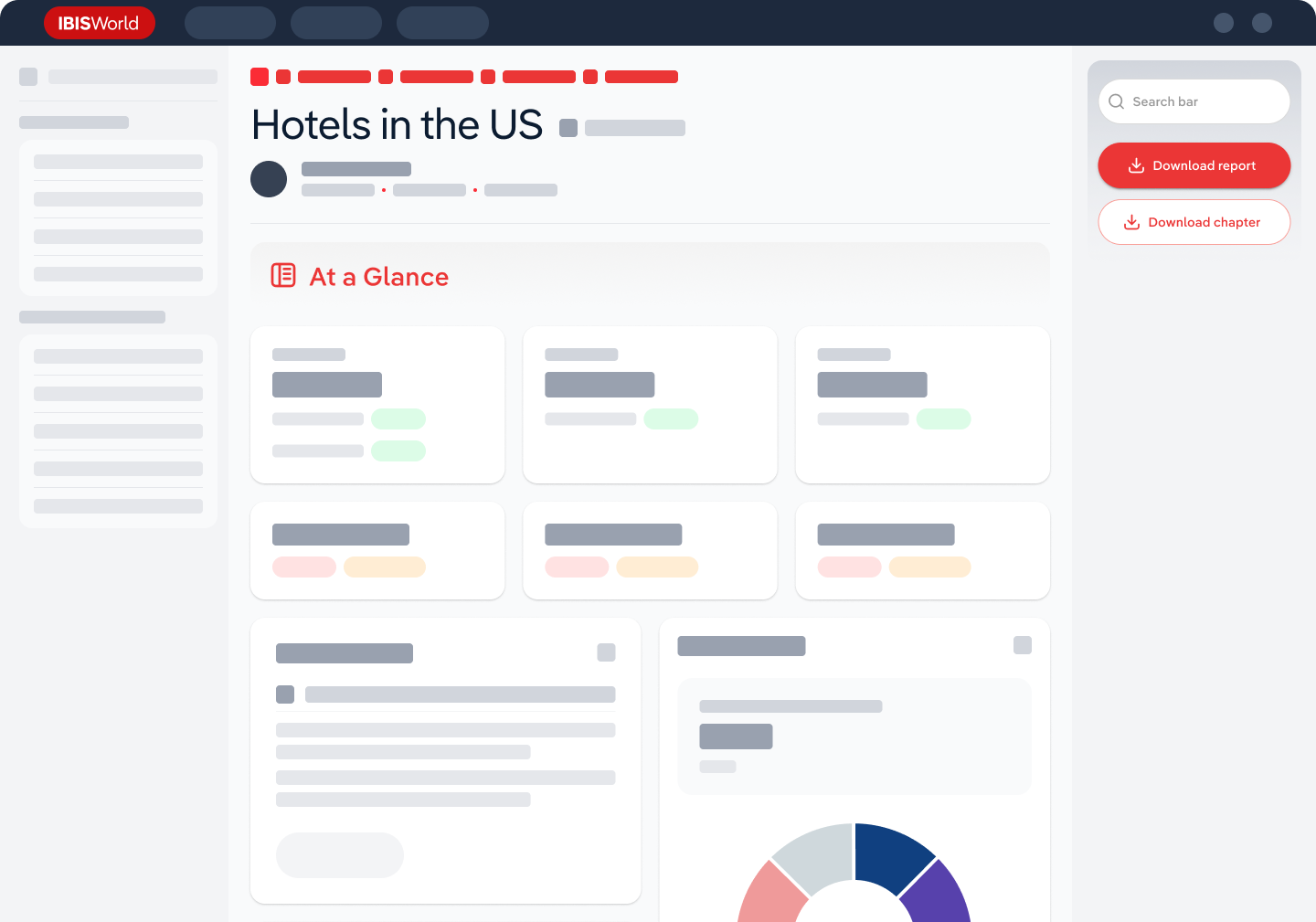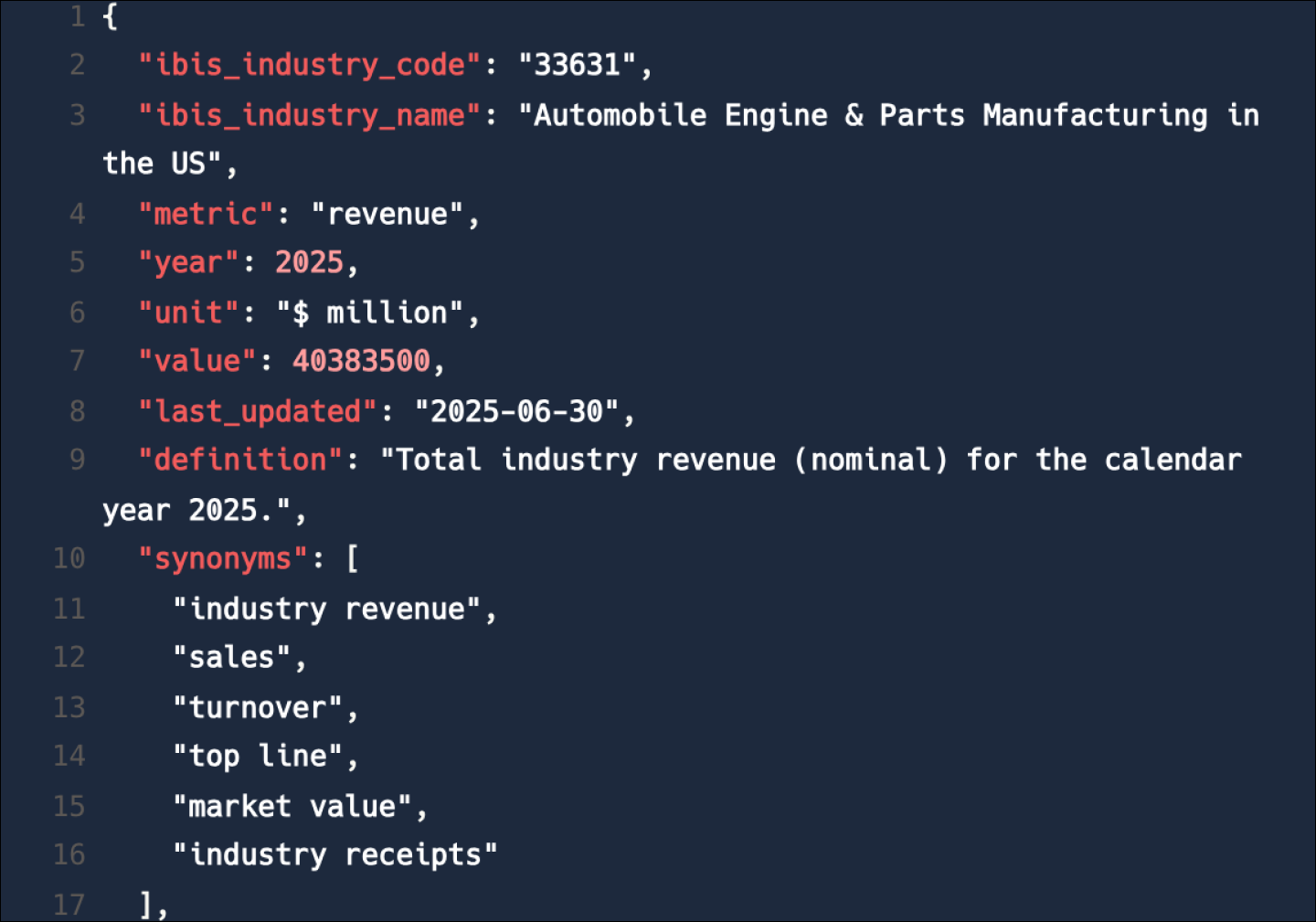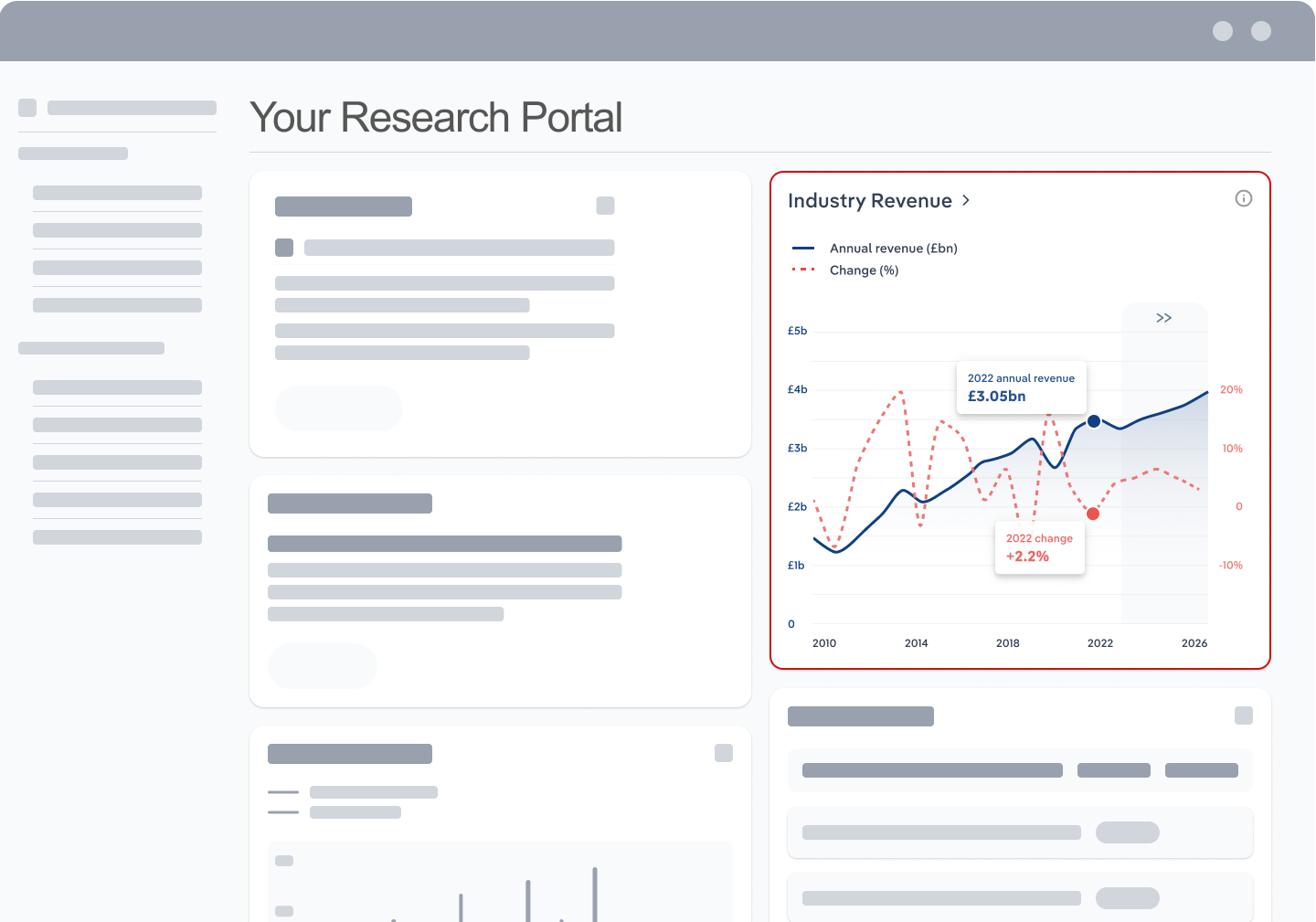Industry Statistics and Trends
Market size and recent performance (2015-2030)
Industry revenue has grown at a CAGR of 1.7 % over the past five years, to reach an estimated $129.4bn in 2025.
Trends and Insights
Reinsurers spread risk across a variety of markets and geographical regions
- Reinsurance is global in nature, with coverage spread across a variety of markets and locales to minimize geographical risks. Reinsurers seek to diversify risk by spreading risk across various insurance product lines and geographic markets. This approach not only reduces vulnerability to localized events but also enhances overall portfolio stability, enabling reinsurers to better withstand market fluctuations.
- Additional trends and insights available with purchase
Industry outlook (2026-2031)
Market size is projected to grow over the next five years.
Trends and Insights
Premium pricing is on the rise
- Vehicle insurance payments are increasing as the economy has returned to normalcy following disruptions at the onset of the current period. As the number of motor vehicle registrations climb, along with labor costs and repair costs of modern vehicles, this will contribute to higher vehicle insurance payments. As more vehicles hit the road and the complexity and cost of repairs grow, insurers are compelled to adjust rates to reflect these heightened risks and expenses.
Biggest companies in the Reinsurance Carriers in the US
| Company | Market Share (%)
2025 | Revenue ($m)
2025 | Profit ($m)
2025 | Profit Margin (%)
2025 |
|---|---|---|---|---|
Berkshire Hathaway Inc. | 28,087.8 | 5,959.5 | 21.2 | |
Reinsurance Group Of America, Incorporated | 8,865.7 | 642.3 | 7.2 |
To view the market share and analysis for all 2 top companies in this industry, view purchase options.
Products & Services Segmentation
Industry revenue is measured across several distinct product and services lines, including Life and health reinsurance, Property and casualty reinsurance and Investment activities. Life and health reinsurance is the largest segment of the Reinsurance Carriers in the US.
Trends and Insights
Property and casualty (P&C) insurers cede a larger share to reinsurers
- (P&C) insurance covers the property and liability losses of businesses and individuals. Among the largest lines of insurance within P&C are private passenger auto, homeowners' multiple peril and workers compensation. The segment has grown due to the rise in the number of motor vehicle registrations, boosting private passenger auto insurance lines.
- More insights available in the full report
Table of Contents
About this industry
Industry definition
Companies in this industry specialize in assuming all or part of the risk associated with existing insurance policies originally underwritten by other insurance carriers. The primary business of participants in this industry is insuring insurance companies.
What's included in this industry?
Products and services covered in the Reinsurance Carriers industry in the United States include Property and casualty reinsurance, Automobile reinsurance, Annuities, life and disability income reinsurance, Health and medical reinsurance and Surety and title reinsurance.Companies
Companies covered in the Reinsurance Carriers industry in the United States include Berkshire Hathaway Inc. and Reinsurance Group Of America, Incorporated.Purchase this report to view all 2 major companies in this industry.
Related Terms
Related terms covered in the Reinsurance Carriers industry in the United States include combined ratio, offshore, underwriting performance, capacity, cede, retrocession, affiliated reinsurer, unaffiliated reinsurer, catastrophe (cat) bonds and collateralized reinsurance.Industry Code
NAICS 52413 - Reinsurance Carriers in the US
Performance
Get an indication of the industry's health through historical, current and forward-looking trends in the performance indicators that make or break businesses.
Analyst insights
Demand for reinsurance underwriting increased throughout the current period. Downstream insurance providers sought to cede higher portions of their portfolios to mitigate a w...
In this chapter (4)
- Current Performance
- Outlook
- Volatility
- Life Cycle
Key metrics
- Annual Revenue, Recent Growth, Forecast, Revenue Volatility
- Number of Employees, Recent Growth, Forecast, Employees per Business, Revenue per Employee
- Number of Businesses, Recent Growth, Forecast, Employees per Business, Revenue per Business
- Total Profit, Profit Margin, Profit per Business
Charts
- Revenue, including historical (2015-2024) and forecast (2025-2030)
- Employees, including historical (2015-2024) and forecast (2025-2030)
- Businesses, including historical (2015-2024) and forecast (2025-2030)
- Profit, including historical (2015-2025)
- Industry Volatility vs. Revenue Growth
- Industry Life Cycle
Detailed analysis
- Trends in supply, demand and current events that are driving current industry performance
- Expected trends, economic factors and ongoing events that drive the industry's outlook
- Key success factors for businesses to overcome volatility
- How contribution to GDP, industry saturation, innovation, consolidation, and technology and systems influence the industry's life cycle phase.
Products and Markets
Learn about an industry's products and services, markets and trends in international trade.
Analyst insight
Reinsurance can take a variety of forms. It may compensate insurers for losses within certain limits, a protection for which insurers pay a premium or it may represent a shar...
In this chapter
- Products & Services
- Major Markets
Key metrics
- Largest market segment and value in 2025
- Product innovation level
Charts
- Products & services segmentation in 2025
- Major market segmentation in 2025
Detailed analysis
- Trends impacting the recent performance of the industry's various segments
- Innovations in the industry's product or service offering, specialization or delivery method
- Key factors that successful businesses consider in their offerings
- Buying segments and key trends influencing demand for industry products and services
Geographic Breakdown
Discover where business activity is most concentrated in an industry and the factors driving these trends to find opportunities and conduct regional benchmarking.
Analyst insights
Regions with the largest exposure to natural disasters and other risks have a cluster of industry establishments. Florida represents one of the largest markets for P&C insure...
In this chapter (1)
- Business Locations
Charts
- Share of revenue, establishment, wages and employment in each state
- Share of population compared to establishments in each region in 2025
Tables
- Number and share of establishments in each state in 2025
- Number and share of revenue each state accounts for in 2025
- Number and share of wages each state accounts for in 2025
- Number and share of employees in each state in 2025
Detailed analysis
- Geographic spread of the industry across North America, and trends associated with changes in the business landscape
- Key success factors for businesses to use location to their advantage
Competitive Forces
Get data and insights on what's driving competition in an industry and the challenges industry operators and new entrants may face, with analysis built around Porter's Five Forces framework.
Analyst insights
Some large players attempt to acquire companies that can provide exposure to specific markets. This will increase market share concentration.
In this chapter (4)
- Concentration
- Barriers to Entry
- Substitutes
- Buyer & Supplier Analysis
Key metrics
- Industry concentration level
- Industry competition level and trend
- Barriers to entry level and trend
- Substitutes level and trend
- Buyer power level and trend
- Supplier power level and trend
Charts
- Market share concentration among the top 4 suppliers from 2020-2025
- Supply chain including upstream supplying industries and downstream buying industries, flow chart
Detailed analysis
- Factors impacting the industry’s level of concentration, such as business distribution, new entrants, or merger and acquisition activity.
- Key success factors for businesses to manage the competitive environment of the industry.
- Challenges that potential industry entrants face such as legal, start-up costs, differentiation, labor/capital intensity and capital expenses.
- Key success factors for potential entrants to overcome barriers to entry.
- Competitive threats from potential substitutes for the industry’s own products and services.
- Key success factors for how successful businesses can compete with substitutes.
- Advantages that buyers have to keep favorable purchasing conditions.
- Advantages that suppliers have to maintain favorable selling conditions.
- Key success factors for how businesses can navigate buyer and supplier power.
Companies
Learn about the performance of the top companies in the industry.
Analyst insights
Berkshire Hathaway is the largest player in the industry. The company accounts for over 25.0% of revenue.
In this chapter
- Market Share Concentration
- Companies
- Company Spotlights
Charts
- Industry market share by company in 2021 through 2025
- Major companies in the industry, including market share, revenue, profit and profit margin in 2025
- Overview of Berkshire Hathaway Inc.'s performance by revenue, market share and profit margin from 2019 through 2025
- Overview of Reinsurance Group Of America, Incorporated's performance by revenue, market share and profit margin from 2019 through 2025
Detailed analysis
- Description and key data for Berkshire Hathaway Inc., and factors influencing its performance in the industry
- Description and key data for Reinsurance Group Of America, Incorporated, and factors influencing its performance in the industry
External Environment
Understand the demographic, economic and regulatory factors that shape how businesses in an industry perform.
Analyst insights
The Terrorism Risk Insurance Act is the most notable form of assistance for the industry. The Act requires private insurers to offer terrorism insurance coverage in the event...
In this chapter
- External Drivers
- Regulation & Policy
- Assistance
Key metrics
- Regulation & policy level and trend
- Assistance level and trend
Charts
- Regulation & Policy historical data and forecast (2015-2030)
- Assistance historical data and forecast (2015-2030)
Detailed analysis
- Demographic and macroeconomic factors influencing the industry, including Regulation & Policy and Assistance
- Major types of regulations, regulatory bodies, industry standards or specific regulations impacting requirements for industry operators
- Key governmental and non-governmental groups or policies that may provide some relief for industry operators.
Financial Benchmarks
View average costs for industry operators and compare financial data against an industry's financial benchmarks over time.
Analyst insights
The Federal Reserve raised interest rates to tackle rampant inflation. Higher rates resulted in higher interest income and boosted industry profit.
In this chapter
- Cost Structure
- Financial Ratios
- Key Ratios
Key metrics
- Profit margin, and how it compares to the sector-wide margin
- Average wages, and how it compares to the sector-wide average wage
- Largest cost component as a percentage of revenue
- Industry average ratios for days' receivables, industry coverage and debt-to-net-worth ratio
Charts
- Average industry operating costs as a share of revenue, including purchases, wages, depreciation, utilities, rent, other costs and profit in 2025
- Average sector operating costs as a share of revenue, including purchases, wages, depreciation, utilities, rent, other costs and profit in 2025
- Investment vs. share of economy
Data tables
- Industry Multiples (2018-2023)
- Industry Tax Structure (2018-2023)
- Income Statement (2018-2023)
- Balance Sheet (2018-2023)
- Liquidity Ratios (2018-2023)
- Coverage Ratios (2018-2023)
- Leverage Ratios (2018-2023)
- Operating Ratios (2018-2023)
- Cash Flow & Debt Service Ratios (2015-2030)
- Revenue per Employee (2015-2030)
- Revenue per Enterprise (2015-2030)
- Employees per Establishment (2015-2030)
- Employees per Enterprise (2015-2030)
- Average Wage (2015-2030)
- Wages/Revenue (2015-2030)
- Establishments per Enterprise (2015-2030)
- IVA/Revenue (2015-2030)
- Imports/Demand (2015-2030)
- Exports/Revenue (2015-2030)
Detailed analysis
- Trends in the cost component for industry operators and their impact on industry costs and profitability
Key Statistics
Industry Data
Data Tables
Including values and annual change:
- Revenue (2015-2030)
- IVA (2015-2030)
- Establishments (2015-2030)
- Enterprises (2015-2030)
- Employment (2015-2030)
- Exports (2015-2030)
- Imports (2015-2030)
- Wages (2015-2030)
Top Questions Answered
Unlock comprehensive answers and precise data upon purchase. View purchase options.
What is the market size of the Reinsurance Carriers industry in the United States in 2026?
The market size of the Reinsurance Carriers industry in the United States is $129.4bn in 2026.
How many businesses are there in the Reinsurance Carriers industry in the United States in 2025?
There are 198 businesses in the Reinsurance Carriers industry in the United States, which has grown at a CAGR of 3.3 % between 2020 and 2025.
How may import tariffs affect the Reinsurance Carriers industry in the United States?
The Reinsurance Carriers industry in the United States is unlikely to be materially impacted by import tariffs with imports accounting for a low share of industry revenue.
How may export tariffs affect the Reinsurance Carriers industry in the United States?
The Reinsurance Carriers industry in the United States is unlikely to be materially impacted by export tariffs with exports accounting for a low share of industry revenue.
Has the Reinsurance Carriers industry in the United States grown or declined over the past 5 years?
The market size of the Reinsurance Carriers industry in the United States has been growing at a CAGR of 1.7 % between 2020 and 2025.
What is the forecast growth of the Reinsurance Carriers industry in the United States over the next 5 years?
Over the next five years, the Reinsurance Carriers industry in the United States is expected to grow.
What are the biggest companies in the Reinsurance Carriers industry in the United States?
The biggest companies operating in the Reinsurance Carriers industry in the United States are Berkshire Hathaway Inc. and Reinsurance Group Of America, Incorporated
What does the Reinsurance Carriers industry in the United States include?
Property and casualty reinsurance and Automobile reinsurance are part of the Reinsurance Carriers industry in the United States.
Which companies have the highest market share in the Reinsurance Carriers industry in the United States?
The company holding the most market share in the Reinsurance Carriers industry in the United States is Berkshire Hathaway Inc..
How competitive is the Reinsurance Carriers industry in the United States?
The level of competition is moderate and steady in the Reinsurance Carriers industry in the United States.
Methodology
How are IBISWorld reports created?
IBISWorld has been a leading provider of trusted industry research for over 50 years to the most successful companies worldwide. With offices in Australia, the United States, the United Kingdom, Germany and China, we are proud to have local teams of analysts that conduct research, data analysis and forecasting to produce data-driven industry reports.
Our analysts start with official, verified and publicly available sources of data to build the most accurate picture of each industry. Analysts then leverage their expertise and knowledge of the local markets to synthesize trends into digestible content for IBISWorld readers. Finally, each report is reviewed by one of IBISWorld’s editors, who provide quality assurance to ensure accuracy and readability.
IBISWorld relies on human-verified data and human-written analysis to compile each standard industry report. We do not use generative AI tools to write insights, although members can choose to leverage AI-based tools within the platform to generate additional analysis formats.
What data sources do IBISWorld analysts use?
Each industry report incorporates data and research from government databases, industry-specific sources, industry contacts, and our own proprietary database of statistics and analysis to provide balanced, independent and accurate insights.
Key data sources in the US include:
- US Census Bureau
- US Bureau of Labor Statistics
- US International Trade Commission
Analysts also use industry specific sources to complement catch-all sources, although their perspective may focus on a particular organization or representative body, rather than a clear overview of all industry operations. However, when balanced against other perspectives, industry-specific sources provide insights into industry trends.
These sources include:
- Industry and trade associations
- Industry federations or regulators
- Major industry players annual or quarterly filings
Finally, IBISWorld’s global data scientists maintain a proprietary database of macroeconomic and demand drivers, which our analysts use to help inform industry data and trends. They also maintain a database of statistics and analysis on thousands of industries, which has been built over our more than 50-year history and offers comprehensive insights into long-term trends.
How does IBISWorld forecast its data?
IBISWorld’s analysts and data scientists use the sources above to create forecasts for our proprietary datasets and industry statistics. Depending on the dataset, they may use regression analysis, multivariate analysis, time-series analysis or exponential smoothing techniques to project future data for the industry or driver. Additionally, analysts will leverage their local knowledge of industry operating and regulatory conditions to impart their best judgment on the forecast model.
IBISWorld prides itself on being a trusted, independent source of data, with over 50 years of experience building and maintaining rich datasets and forecasting tools. We are proud to be the keystone source of industry information for thousands of companies across the world.
Learn more about our methodology and data sourcing on the Help Center.










